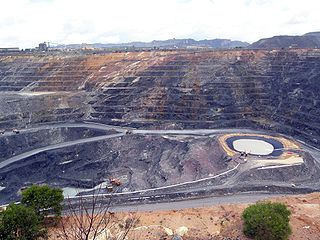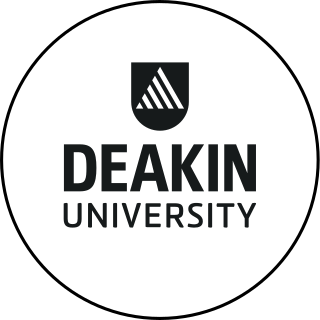Haydon Manning is an Australian political scientist and Adjunct Professor with the College of Business, Government and Law at The Flinders University of South Australia.

Thomas Richard Kenyon is a former Australian politician who represented the South Australian House of Assembly seat of Newland for the Labor Party from the 2006 election until his defeat in 2018.

Nuclear weapons testing, uranium mining and export, and nuclear power have often been the subject of public debate in Australia, and the anti-nuclear movement in Australia has a long history. Its origins date back to the 1972–73 debate over French nuclear testing in the Pacific and the 1976–77 debate about uranium mining in Australia.

Peak Downs is a large open cut coking coal mine in Queensland located 31 km SSE of Moranbah. Peak Downs is one of seven mines in Bowen Basin owned by BMA, Australia’s largest coal miner and exporter. Production at Peak Downs started in 1972.
The three-mine policy, introduced in 1984 and abandoned in 1996, was a policy of the government of Australia to limit the number of uranium mines in the country to three.
The Australasian Institute of Mining and Metallurgy (AusIMM) provides services to professionals engaged in all facets of the global minerals sector and is based in Carlton, Victoria, Australia.

The Olympic Dam mine is a large poly-metallic underground mine located in South Australia, 550 km NNW of Adelaide. It is the fourth largest copper deposit and the largest known single deposit of uranium in the world, although copper is the largest contributor to total revenue. Approximately 70% of the mine's revenue comes from copper, 25% from uranium, and the remainder from silver and gold. BHP Billiton has owned and operated the mine since 2005. The mine was previously owned by Western Mining Corporation.
Dr Ian Geoffrey Gould is a former Chancellor of the University of South Australia (2008–2015) and former Managing Director (Australia) of Rio Tinto Group. Gould is considered to be one of South Australia's most influential people.

The South Australian Chamber of Mines and Energy (SACOME) is the industry body representing companies with interests in the South Australian minerals, energy, extractive, and oil & gas sectors, including those who provide services to these companies. SACOME is a not-for-profit, non-government organisation founded in 1979, and comprises a small team serving the needs of approximately 200 member organisations. SACOME are governed by a council that oversees organisational priorities and policy direction and are guided by many committees that focus on specific aspects of the sector.
Ian Hore-Lacy is an Australian nuclear industry communicator, author and advocate for nuclear power in Australia. He works as a Senior Research Analyst at the World Nuclear Association, London.

David Noonan is an Australian environmentalist and member of the anti-nuclear movement in Australia. Noonan is a former anti-nuclear campaigner for the Australian Conservation Foundation, and has been a prominent spokesperson during campaigns against the expansion of uranium mining in Australia and against the establishment of nuclear waste storage facilities. He has a science degree and a Masters in Environmental Studies.
The Uranium Council is an entity created by the Australian Government in 2009. Chair Mark Chalmers has described it as "a combined Australian Government, Industry and Stakeholders committee organized to review and remove impediments to Australia’s uranium exploration and development policy." It contains representatives from Commonwealth, State and Territory Governments, the uranium industry and the Northern Land Council.
Michels Warren is a South Australian public relations firm headquartered on Melbourne Street in North Adelaide and established in 1978. The company claims to be Adelaide's oldest Australian-owned PR consultancy, specialises in "building and protecting brands" and serves clients from public, private and not-for-profit sectors. In 2003 Phil Martin acquired the firm from former owners Daryl Warren and Janet Grieve, merging with Maverick Media & PR. In 2013 the agency employed 14 staff. The firm works closely with Keito Events, which is managed by former Michels Warren employee, Kate Abrahams.
The established nuclear industry in South Australia is focused on uranium mining, milling and the export of uranium oxide concentrate for use in the production of nuclear fuel for nuclear power plants. The state is home to the world's largest known single deposit of uranium, which is worked by BHP Billiton at the Olympic Dam mine. Contaminated legacy sites exist at Maralinga and Emu Field, where nuclear weapons tests were conducted in the 1950s and 1960s and at former uranium mines and milling sites. Nuclear waste is stored by CSIRO at Woomera and future waste storage prospects were considered during the deliberations of the Nuclear Fuel Cycle Royal Commission in 2016. The Commission has recommended that South Australia considers opportunities in nuclear waste storage, the establishment of a nuclear fuel leasing scheme and the repeal of prohibitions which currently prevent future nuclear industrial development nationally.
Dr Ian Duncan is a businessman active in the Australian resources sector. He is a past president of operations at the Olympic Dam mine in South Australia under Western Mining Corporation. He was Chairman of the London-based Uranium Institute in 1995-1996. From the 1990s to the present, Duncan has advocated for nuclear industrial development in Australia, specifically the development of facilities to store and dispose of nuclear waste and the legalization and development of nuclear power plants for the generation of electricity. He is a Fellow of the Australian Academy of Technology, Science and Engineering (ATSE), the Australasian Institute of Mining and Metallurgy (AusIMM), and Engineers Australia.












